外研版九年级下册 Module 3 Unit 3 Language in use. 课件 (共78张PPT)
文档属性
| 名称 | 外研版九年级下册 Module 3 Unit 3 Language in use. 课件 (共78张PPT) | 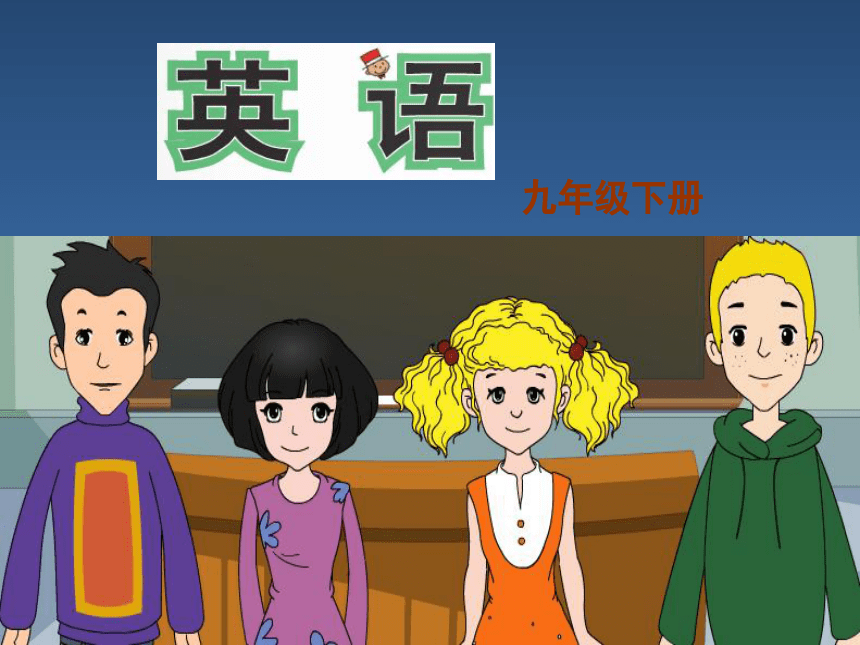 | |
| 格式 | ppt | ||
| 文件大小 | 6.0MB | ||
| 资源类型 | 教案 | ||
| 版本资源 | 外研版 | ||
| 科目 | 英语 | ||
| 更新时间 | 2022-08-16 18:26:13 | ||
图片预览

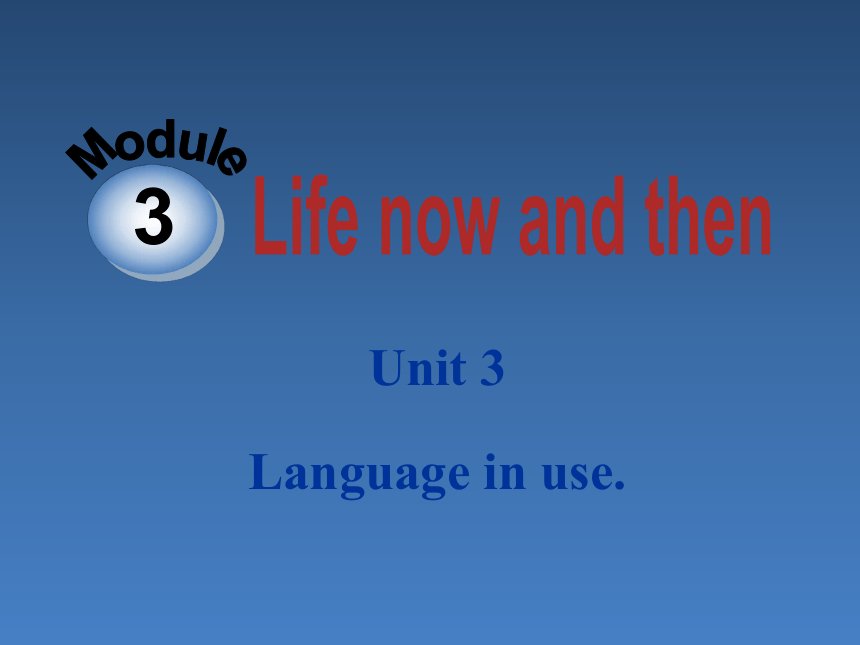
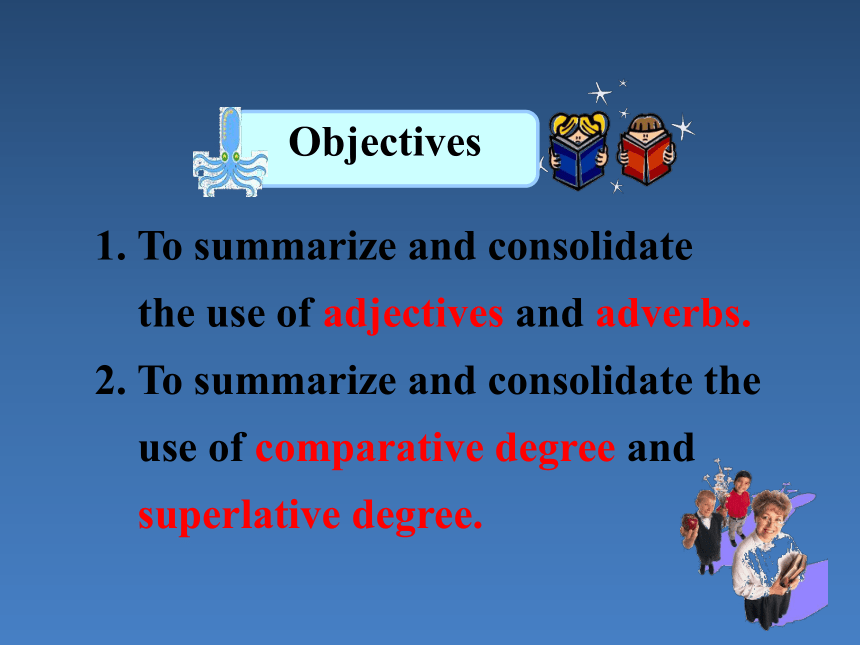
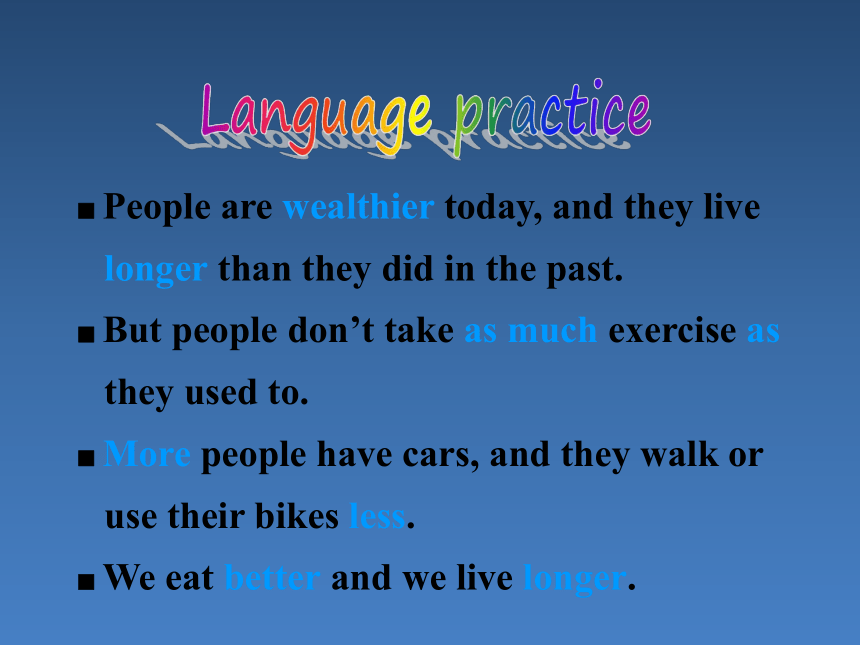
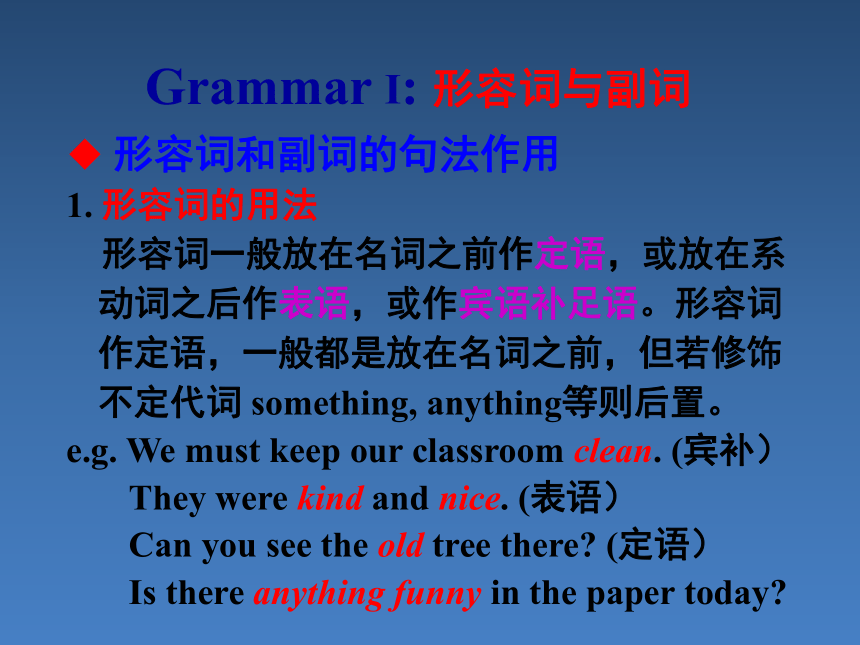
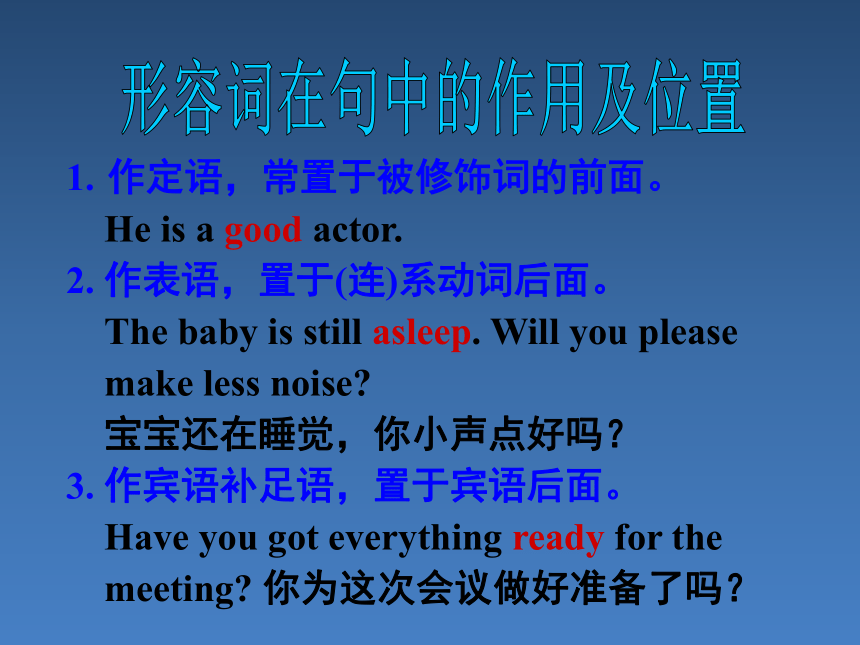
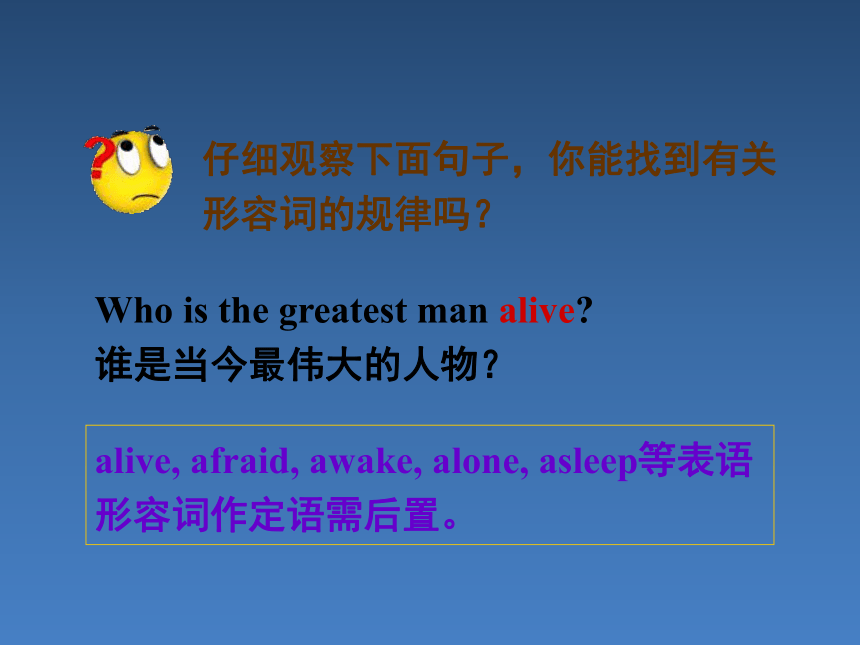
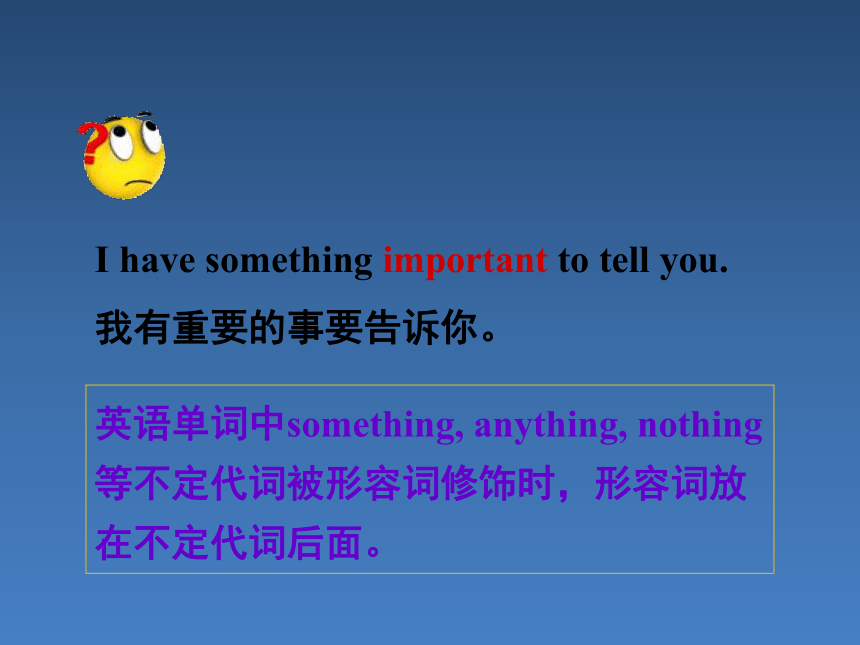

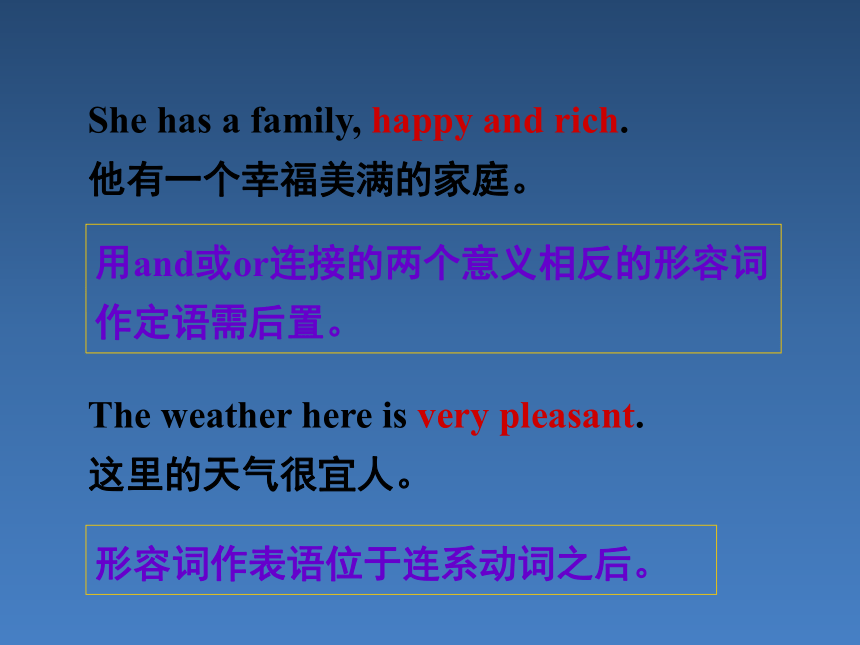
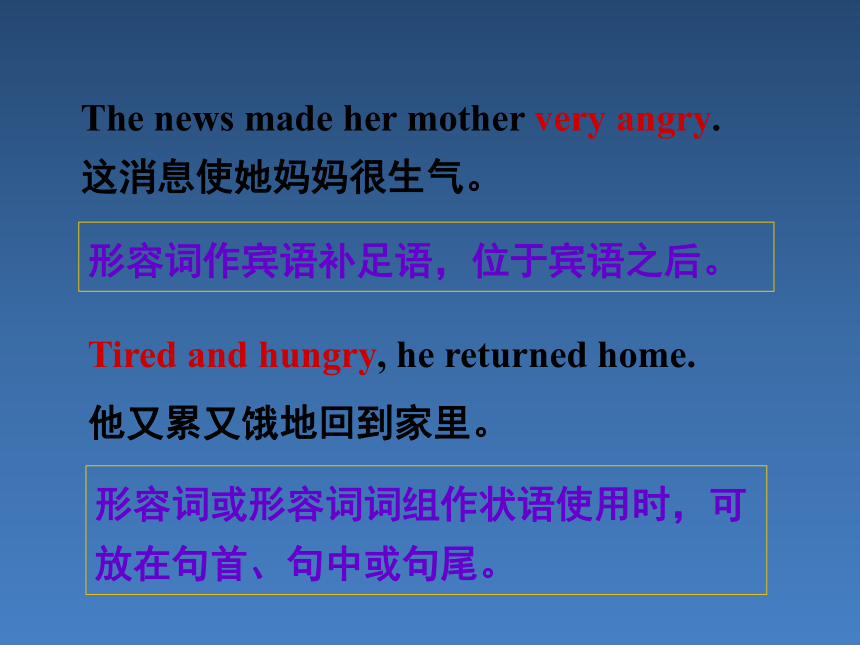
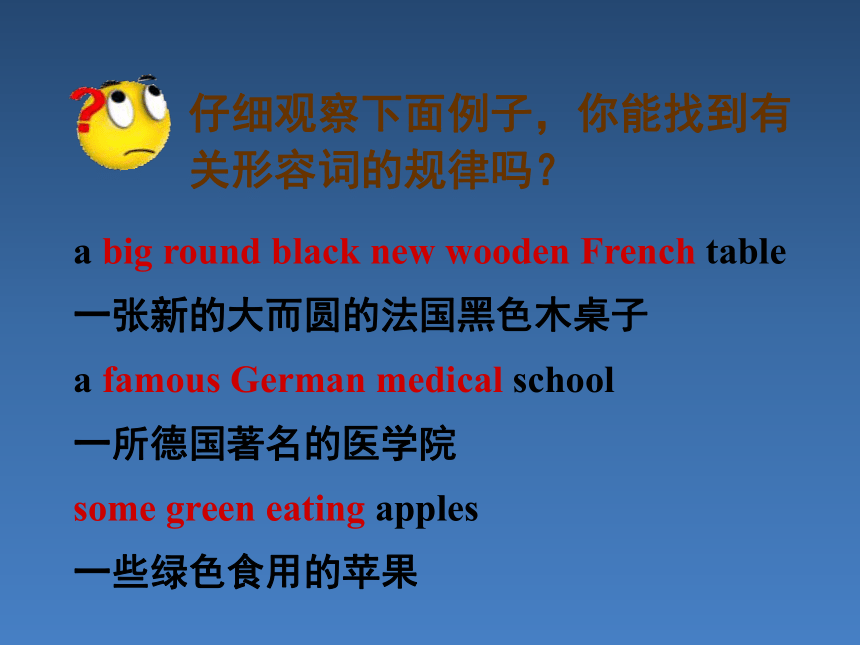
文档简介
(共78张PPT)
3
Unit 3
Language in use.
To summarize and consolidate
the use of adjectives and adverbs.
2. To summarize and consolidate the
use of comparative degree and
superlative degree.
Objectives
■ People are wealthier today, and they live
longer than they did in the past.
■ But people don’t take as much exercise as
they used to.
■ More people have cars, and they walk or
use their bikes less.
■ We eat better and we live longer.
Grammar Ⅰ: 形容词与副词
形容词和副词的句法作用
1. 形容词的用法
形容词一般放在名词之前作定语,或放在系动词之后作表语,或作宾语补足语。形容词作定语,一般都是放在名词之前,但若修饰不定代词 something, anything等则后置。
e.g. We must keep our classroom clean. (宾补)
They were kind and nice. (表语)
Can you see the old tree there (定语)
Is there anything funny in the paper today
作定语,常置于被修饰词的前面。
He is a good actor.
2. 作表语,置于(连)系动词后面。
The baby is still asleep. Will you please
make less noise
宝宝还在睡觉,你小声点好吗?
3. 作宾语补足语,置于宾语后面。
Have you got everything ready for the
meeting 你为这次会议做好准备了吗?
alive, afraid, awake, alone, asleep等表语
形容词作定语需后置。
Who is the greatest man alive
谁是当今最伟大的人物?
仔细观察下面句子,你能找到有关
形容词的规律吗?
I have something important to tell you.
我有重要的事要告诉你。
英语单词中something, anything, nothing等不定代词被形容词修饰时,形容词放在不定代词后面。
away,long,wide,high,deep,old等词
附有数量词语说明时需后置。
The road is about 50 metres wide.
这条路大约50米宽。
He is a man full of energy.
他是一个充满活力的人。
形容词+介词短语或不定式短语作定语需
后置。
用and或or连接的两个意义相反的形容词
作定语需后置。
She has a family, happy and rich.
他有一个幸福美满的家庭。
The weather here is very pleasant.
这里的天气很宜人。
形容词作表语位于连系动词之后。
形容词作宾语补足语,位于宾语之后。
The news made her mother very angry.
这消息使她妈妈很生气。
Tired and hungry, he returned home.
他又累又饿地回到家里。
形容词或形容词词组作状语使用时,可
放在句首、句中或句尾。
a big round black new wooden French table
一张新的大而圆的法国黑色木桌子
a famous German medical school
一所德国著名的医学院
some green eating apples
一些绿色食用的苹果
仔细观察下面例子,你能找到有
关形容词的规律吗?
a beautiful little young British policeman
一位年轻高大的英国警察
a pretty purple silk dress
一件漂亮的紫色丝绸裙子
the boy’s little nice red toy car
这个男孩的漂亮的红色小玩具车
多个形容词修饰名词的大体顺序是:
限定 描绘 大(小) 长 (短) 高 (低)
形状 年龄 新 (旧) 老 (少) 颜色 国籍 出处 材料 作用
类别等 +名词
下面顺口溜有助于你记忆:
品大新形色国料
副词用来修饰动词、形容词、其它副词、 全句或名词词组及句子的词。常用的有:ago, before, now, then, soon, already, yet, here, there, up, down, above, below, inside, outside, where, very, much, so, too, quite, enough, easily, quietly, also, too, only等。在句中用作状语、表语、定语、宾补等成分。
2. 副词的用法
Our school is very beautiful.
It was rather hot that day.
He studies much harder now.
仔细观察下面句子,你能找到什
么规律?
副词修饰形容词、副词时,放在它所修饰
的词的前面。
I don’t know him well enough. 我不够了解他。
enough作为副词总是置于被修饰的形容词或副词后。
enough作为形容词时可位于名词前或者名
词后。
We haven’t enough food for you.
= We haven’t food enough for you.
我们没有足够的食物分给你们。
频度副词、程度副词可放在be动词、情态动词和助动词之后,实意动词之前。
She has never been to Beijing. 她从未去过北京。
They stayed at home last night. 昨晚他们在家。
Last night (时间副词) they stayed at home
(地点副词).
时间副词和地点副词一般位于句尾。如两种副词同时出现,一般地点副词放在时间副词之前,也可将时间副词放在句首。
Please listen carefully. 请认真地听讲。
Please listen to me carefully.请认真地听我讲。
方式副词修饰及物动词可在及物动词前或宾语后,修饰不及物动词在修饰的动词后或在介词+宾语后。
The people here are very friendly. 这里的人
都很友好。
副词作定语,一般放在被修饰的名词后。
The light is still on. 电灯还在亮着。
Her office is just above. 她的办公室就在上面。
副词作表语表示位置,位于系动词后。
I’m pleased to see you back.
看到你回来我很高兴。
副词作宾语补足语位于宾语后。
Review the comparative degree and superlative adjectives and adverbs.
大多数形容词(性质形容词)和副词有比较级和最高级的变化,即原级、比较级和最高级,用来表示事物的等级差别。原级即形容词的原形,比较级和最高级有规则变化和不规则变化两种。
Grammar Ⅱ:
构成法 原级 比较级 最高级
一般单音节词末尾加-er, -est tall great taller greater tallest greatest
以不发音的e结尾的单音词和少数以- le结尾的双音节词只加-r, -st nice large able nicer larger abler nicest largest ablest
1). 规则变化 单音节词和少数双音节词, 在词尾加-er,
-est来构成比较级和最高级。
以一个辅音字母结尾的闭音节单音节词, 双写结尾的辅音字母,再加-er, -est big hot bigger hotter biggest hottest
少数以-er, -ow结尾的双音节词末尾加-er, -est clever
narrow cleverer narrower cleverest narrowest
其他双音节词和多音节词, 在前面加more, most来构成比较级和最高级 careful more careful most
careful
2). 不规则变化
原级 比较级 最高级
good , well better best
bad, ill worse worst
old older / elder oldest / eldest
much/ many more most
little less least
far farther /
further farthest /
furthest
3). 形容词、副词等级的用法
1. 原级的用法
只能修饰原级的词, very, quite, so, too。
e.g. He is too tired to walk on.
他太累了走不动了。
My brother runs so fast that I can’t
follow him.
我哥哥跑得太快了, 我跟不上他。
2. 原级常用的句型结构
(1)“甲+be+(倍数)+as+形容词原级+as+乙”表
示“甲和乙程度相同”或“甲是乙的几倍”。
e.g. Tom is as old as Kate.
汤姆和凯特一样大。
“甲+实意动词+(倍数)+as+副词原级+as+乙”
表示“甲和乙程度相同”或“甲是乙的几倍”。
e.g. Tom runs as fast as Mike.
汤姆和麦克跑得一样快。
(2)“甲+be + not + as / so+形容词原级+as+乙”
表示“甲不如乙…”。
e.g. This room is not as / so big as that one.
这个房间没有那个大。
“甲+助动词+not+动词原形+as / so+副词原
级+as+乙”表示“甲不如乙…”。
e.g. He doesn’t walk as slowly as you.
他走得没有你走得慢。
形容词和副词的比较等级
1. 常用的比较级的句型:
1) A + 谓动词 + 比较级 + than +B.
e.g. Mary is younger than Betty.
He got up earlier than I did this morning.
2) 主语 + 动词 + the 比较级 + of the two.
(说明:在of the two这样的比较范围或特指
哪一个时, 比较级前要加the)
e.g. Tom is the taller of the two.
Lily runs faster of the two.
3) The + 比较级, the + 比较级, 表示“越……,
越……”。
e.g. The more you study, the more you know.
你学的越多, 知道的越多。
The harder the test is, the lower marks we get.
测试题越难, 我们的得分越少。
4) 比较级 + and + 比较级, 表示“越来越……”。
e.g. The computer is cheaper and cheaper.
计算机越来越便宜。
He studies harder and harder.
他学习越来越努力。
1. the + 最高级 + of/ in…
常用的最高级表达方式:
e.g. Jim is the tallest of the three.
吉姆是三个人中最高的。
He is the most diligent student in his
class. 他是班上最勤奋的学生。
2. 选择疑问句
e.g. It is the most interesting book I have
ever read.
这是我所读过的最有趣的一本书。
3. the + 最高级 + 定语从句
e.g. Who is the tallest, Tom, Jack or Bill
汤姆、杰克和比尔, 谁个子最高?
比较级和最高级的修饰语应置于其所修饰的形容词或副词之前。常见的比较级修饰语有much, still, a lot, even, far等。
e.g. He works much harder than then.
他比那时工作要努力得多。
e.g. This is by far the most expensive bag
in the shop.
这是目前这家商店里最贵的包。
常见的最高级修饰语有almost, by far, far, much等。
Complete the passage with the
correct form of the words in brackets.
For many people, life is a lot (1) _________
(easy) today. Medicine and diet are improving,
and people are getting (2) _________________
(healthy) and living (3) __________ (long). But
communication is changing (4) ____________
(fast) of all. Today, with the Internet, people
can communicate(5) ___________ (easily)
healthier/more healthy
longer
easier
fast/the fastest
more easily
than ever before with friends all over the
world.
Not all the changes are (6) ________(good)
ones. More people drive cars instead of
riding bikes, so they are not as (7) ____(fit)
as they were. Increasing traffic makes the
roads (8) ______________ (crowded) than
ever, and it also makes pollution (9)______
(bad). We must all work harder to reduce
pollution.
good
fit
more crowded
worse
Work in pairs. Look at the two
pictures and talk about how the town
has changed. Use the words in the
box to help you.
big, building, busy, house,
modern, more, shop, street,
tall, traffic, tree
1. The buildings are much taller, much more beautiful and much newer.
The sample answers
2. There are more cars in the street today
than it was 50 years ago.
3. The streets are much wider and cleaner.
4. The environment is much better.
5. People are much busier than before.
6. The life is much better than before.
7. There are more shops than before.
3. Complete the sentences with the
words or expressions in the box.
heat, more than, seldom, spare, speak up
1. We ________ have time to go on holiday.
2. We do not have much _________
time because we have important
exams this year.
seldom
spare
3. Never go out in the ______of the day
without a hat.
4. You have to __________ because the
students in the back cannot hear you.
5. Mr Smith is __________ a teacher.
Most of his pupils think of
him as their friend.
heat
speak up
more than
4. Read the email and find three
examples that show life was harder
in the past than it is today.
FROM: Gran
TO: Christine
SUBJECT: The lives of children in Victorian Britain
Dear Christine,
You asked me for help about your school
project - the lives of children in Victorian
Britain. I was also interested. I searched online
and found out the following.
In Victorian Britain, thousands of people
came to the cities to work in the factories.
Instead of the green, open countryside, people
lived in very small houses, very close to each
other, with no space for children to play.
Families in those days were quite big. Often,
there were four or five children in one family,
and they all had to sleep in houses of just two
rooms. Sometimes, a whole street had to share
one outside toilet. Can you imagine that
Most of the big cities were dirty and
unhealthy. The pollution from factories filled
the air. People put their rubbish outside in the
streets. As a result, there were many illnesses.
And life was harder for children in those
times. They didn’t always go to school,
because they had to work instead. Many
children started work in factories when they
were only four or five years old. They worked
twelve hours a day in dangerous jobs for very
little money. Many were hurt in accidents
with machines.
I hope this is helpful. Write to me if you
need more information.
With love,
Gran
Read the email again. Find
sentences that tell us:
1. There was not enough living space for
people.
2. Most of the big cities were dirty and
unhealthy.
3. Life was harder for children in those times.
Write examples.
People lived in very small houses, very close to each other, with no space for children to play.
___________________________________.
3. ___________________________________.
1. There was not enough living space for people.
People lived in very small houses, very close to
each other, with no space
for children to play.
Families in those days
were quite big. A whole
street had to share one
outside toilet.
One possible version
2. Most of the big cities were dirty and
unhealthy.
The pollution from factories filled the air.
People put their rubbish
outside in the streets.
As a result, there were
many illnesses.
3. Life was harder for children in those times.
They didn’t always go to school, because they
had to work instead. Many children started
work in factories when they
were only four or five years
old. They worked twelve
hours a days in dangerous
jobs for very little money.
Some difficult points:
1. be interested in doing sth. 有兴趣做某事
2. thousands of 成千上万的
3. instead of 代替, 而不是
4. close to: near 接近, 靠近
5. share one outside toilet
共用一个室外的厕所
6. as a result 结果是
7. many diseases 许多疾病
When you do a listening or reading exercise, you should read the instructions carefully. Then you can focus your attention just on the information you need. You don’t have to understand
every word.
6. Listen and complete the table.
Grandmother Mother
Age to start school
Age to start work
Age to get married
Number of children
Age to stop working
8 years old
14 years old
18 years old
four children
50 years old
55 years old
one child
24 years old
22 years old
6 years old
7. Write a passage comparing the
lives of the speaker’s grandmother
and mother in Activity 6.
The speaker’s grandmother and mother have
lived very different lives. Her grandmother had
a much bigger family…
Write a passage comparing their lives.
The grandmother had eight brothers and sisters so she had a bigger family. She started school when she was older, but she left school earlier. The grandmother only went to school for 6 years, while the mother went to school for 12 years, and to
A Sample
university. The grandmother worked hard in
a factory from 14 until she was 50, and the mother worked as a teacher from 22 and will finish working when she is 55; she also has a long summer holiday. The grandmother got
married at 18 and had her first baby a year later; she had four children. On the other hand, the mother got married at 24, and only had one child at the age of 25.
change
Features Differences
Cars
The modern car has changed life a great
deal. Before the invention of the car, people
had to travel by rail, on horseback or by
horse-drawn carriage, or on foot. Using
horses for travel was slow, and of course
walking was even slower. Cars allow people
to travel long distances quickly, in comfort
and convenience.
The car also solved an enormous problem
caused by using horses for transport in cities:
manure! There were so many
horses in large cities that it
was almost impossible to get
rid of the manure. Modern
people are used to the idea
that cars cause pollution,
but the first cars actually
made cities cleaner!
In the past Modern
Ways
Features
More information
horse, horse-drawn
carriage, on foot
slow, too much
manure
cars
quick,
comfortable,
convenient,
cleaner than
horse carriage
horse-drawn carriage 马车
e.g. The horse-drawn carriage is the main
means of transportation in the past.
马车在过去是主要的交通工具。
2. manure vt. 施肥于;耕种
n. 肥料;粪肥.
v.施肥于;耕种
n. 肥料;粪肥.
e.g. To manure land is to spread manure on it.
给土地施肥是把粪肥洒在土地上。
3. get rid of 除掉, 去掉; 涤荡; 革除; 摒除;
e.g. She had a mad urge to write a check and
get rid of him. 她疯了似的想快速涂写支
票, 想赶快摆脱他。
Get rid of the distractions around you.
除去周围分散你注意力的事物。
4. be used to do sth. 被用来做某事
e.g. Computers are used to do many things for
people now.
现在计算机被用来做许多事情。
8. Work in groups. Read the motion
of the debate.
Organising a debate
Health is more important than wealth.
Now decide who is for the motion
and who is against it. You can use
some of the following ideas:
● Without health,
wealth means
nothing.
● You can enjoy life
better if you are
healthy.
● It is hard to be
healthy without
wealth.
● You can enjoy life
better if you are
wealthy.
For:
Against:
9. Prepare your arguments. Give
examples to support your ideas.
Health is more important than wealth.
Examples:
A healthy scientist
can achieve more
success in his
scientific research.
2. Money can’t help cure all diseases, like cancer or AIDS
and so on.
● Those for the motion give
their opinions.
● Those against the motion
give their opinions.
● Take turns to say what you
think about each other’s
arguments.
10. Hold the debate.
11. Discuss and find out whether
most people are for or against the
motion.
1. ----What do you think of Tom’s speaking
----No one does ____ in our class.
A. good B. better C. well D. best
2. —What a careful boy you are!
—Thank you. In fact, Tom does everything
___ than me.
A. more carefully B. more careful
C. much careful
B
A
一. 单项选择。
3. — The doctor told me____ too much but
I find it difficult.
— The doctor is right. The less you drink,
______ you will be.
A. don’t drink; the healthier B. not to drink; the healthier
C. not to drink; the more healthier D. don’t drink; healthier
B
4. — Which city is your favorite
— Hangzhou, of course. It’s the ____ place
that I want to visit.
A. worse B. worst C. better D .best
D
5. — Dad, how can I get on well with my
classmates
— Try to be friendly to them. That will
make it much____.
A. easily B. more easily C. easy D. easier
D
6. --- Susan, you know what We can have a
dog!
--- Great! But I prefer to have a cat. It is
much ______ to look after.
A. easy B. easier C. easiest
B
7. —Which do you like _____, summer or
winter
—I prefer summer.
A. good B. well
C. better D. best
C
8. — It’s so cold today.
— Yes, it’s _____ colder than it was
yesterday.
A. some B. more C. very D. much
D
9. The more you smile, the _____ you
will feel.
A. happy B. happier C. happily D. more happily
B
10. Nancy and Lucy are twins. In some way
they look the same, but Nancy is _____
than Lucy.
A. tall B. taller C. tallest
B
11. Linda jumped than Helen at the
sports meeting.
A. the highest B. high C. higher
C
二、 完成句子。
Bob is _________ ( young ) than Fred but
________ (tall) than Fred.
2. Yingtian is not as __________ (tall) as
Yongxian.
3. Almost all the students’ faces are the same
but Li Deming looks _______ (fat) than
before.
4. Which is _________ (heavy), a hen or a
chicken
younger
taller
tall
fatter
heavier
5. Annie says Sally is the ________ (kind)
person in the world.
6. A dictionary is much ________________
(expensive) than a story-book.
7. An orange is a little _________ (big) than
an apple, but much ________ (small)
than a watermelon.
kindest
more expensive
bigger
smaller
Homework
1. Finish the exercises in the workbook.
2. Finish writing the passage comparing
their lives in the Activity 7.
3
Unit 3
Language in use.
To summarize and consolidate
the use of adjectives and adverbs.
2. To summarize and consolidate the
use of comparative degree and
superlative degree.
Objectives
■ People are wealthier today, and they live
longer than they did in the past.
■ But people don’t take as much exercise as
they used to.
■ More people have cars, and they walk or
use their bikes less.
■ We eat better and we live longer.
Grammar Ⅰ: 形容词与副词
形容词和副词的句法作用
1. 形容词的用法
形容词一般放在名词之前作定语,或放在系动词之后作表语,或作宾语补足语。形容词作定语,一般都是放在名词之前,但若修饰不定代词 something, anything等则后置。
e.g. We must keep our classroom clean. (宾补)
They were kind and nice. (表语)
Can you see the old tree there (定语)
Is there anything funny in the paper today
作定语,常置于被修饰词的前面。
He is a good actor.
2. 作表语,置于(连)系动词后面。
The baby is still asleep. Will you please
make less noise
宝宝还在睡觉,你小声点好吗?
3. 作宾语补足语,置于宾语后面。
Have you got everything ready for the
meeting 你为这次会议做好准备了吗?
alive, afraid, awake, alone, asleep等表语
形容词作定语需后置。
Who is the greatest man alive
谁是当今最伟大的人物?
仔细观察下面句子,你能找到有关
形容词的规律吗?
I have something important to tell you.
我有重要的事要告诉你。
英语单词中something, anything, nothing等不定代词被形容词修饰时,形容词放在不定代词后面。
away,long,wide,high,deep,old等词
附有数量词语说明时需后置。
The road is about 50 metres wide.
这条路大约50米宽。
He is a man full of energy.
他是一个充满活力的人。
形容词+介词短语或不定式短语作定语需
后置。
用and或or连接的两个意义相反的形容词
作定语需后置。
She has a family, happy and rich.
他有一个幸福美满的家庭。
The weather here is very pleasant.
这里的天气很宜人。
形容词作表语位于连系动词之后。
形容词作宾语补足语,位于宾语之后。
The news made her mother very angry.
这消息使她妈妈很生气。
Tired and hungry, he returned home.
他又累又饿地回到家里。
形容词或形容词词组作状语使用时,可
放在句首、句中或句尾。
a big round black new wooden French table
一张新的大而圆的法国黑色木桌子
a famous German medical school
一所德国著名的医学院
some green eating apples
一些绿色食用的苹果
仔细观察下面例子,你能找到有
关形容词的规律吗?
a beautiful little young British policeman
一位年轻高大的英国警察
a pretty purple silk dress
一件漂亮的紫色丝绸裙子
the boy’s little nice red toy car
这个男孩的漂亮的红色小玩具车
多个形容词修饰名词的大体顺序是:
限定 描绘 大(小) 长 (短) 高 (低)
形状 年龄 新 (旧) 老 (少) 颜色 国籍 出处 材料 作用
类别等 +名词
下面顺口溜有助于你记忆:
品大新形色国料
副词用来修饰动词、形容词、其它副词、 全句或名词词组及句子的词。常用的有:ago, before, now, then, soon, already, yet, here, there, up, down, above, below, inside, outside, where, very, much, so, too, quite, enough, easily, quietly, also, too, only等。在句中用作状语、表语、定语、宾补等成分。
2. 副词的用法
Our school is very beautiful.
It was rather hot that day.
He studies much harder now.
仔细观察下面句子,你能找到什
么规律?
副词修饰形容词、副词时,放在它所修饰
的词的前面。
I don’t know him well enough. 我不够了解他。
enough作为副词总是置于被修饰的形容词或副词后。
enough作为形容词时可位于名词前或者名
词后。
We haven’t enough food for you.
= We haven’t food enough for you.
我们没有足够的食物分给你们。
频度副词、程度副词可放在be动词、情态动词和助动词之后,实意动词之前。
She has never been to Beijing. 她从未去过北京。
They stayed at home last night. 昨晚他们在家。
Last night (时间副词) they stayed at home
(地点副词).
时间副词和地点副词一般位于句尾。如两种副词同时出现,一般地点副词放在时间副词之前,也可将时间副词放在句首。
Please listen carefully. 请认真地听讲。
Please listen to me carefully.请认真地听我讲。
方式副词修饰及物动词可在及物动词前或宾语后,修饰不及物动词在修饰的动词后或在介词+宾语后。
The people here are very friendly. 这里的人
都很友好。
副词作定语,一般放在被修饰的名词后。
The light is still on. 电灯还在亮着。
Her office is just above. 她的办公室就在上面。
副词作表语表示位置,位于系动词后。
I’m pleased to see you back.
看到你回来我很高兴。
副词作宾语补足语位于宾语后。
Review the comparative degree and superlative adjectives and adverbs.
大多数形容词(性质形容词)和副词有比较级和最高级的变化,即原级、比较级和最高级,用来表示事物的等级差别。原级即形容词的原形,比较级和最高级有规则变化和不规则变化两种。
Grammar Ⅱ:
构成法 原级 比较级 最高级
一般单音节词末尾加-er, -est tall great taller greater tallest greatest
以不发音的e结尾的单音词和少数以- le结尾的双音节词只加-r, -st nice large able nicer larger abler nicest largest ablest
1). 规则变化 单音节词和少数双音节词, 在词尾加-er,
-est来构成比较级和最高级。
以一个辅音字母结尾的闭音节单音节词, 双写结尾的辅音字母,再加-er, -est big hot bigger hotter biggest hottest
少数以-er, -ow结尾的双音节词末尾加-er, -est clever
narrow cleverer narrower cleverest narrowest
其他双音节词和多音节词, 在前面加more, most来构成比较级和最高级 careful more careful most
careful
2). 不规则变化
原级 比较级 最高级
good , well better best
bad, ill worse worst
old older / elder oldest / eldest
much/ many more most
little less least
far farther /
further farthest /
furthest
3). 形容词、副词等级的用法
1. 原级的用法
只能修饰原级的词, very, quite, so, too。
e.g. He is too tired to walk on.
他太累了走不动了。
My brother runs so fast that I can’t
follow him.
我哥哥跑得太快了, 我跟不上他。
2. 原级常用的句型结构
(1)“甲+be+(倍数)+as+形容词原级+as+乙”表
示“甲和乙程度相同”或“甲是乙的几倍”。
e.g. Tom is as old as Kate.
汤姆和凯特一样大。
“甲+实意动词+(倍数)+as+副词原级+as+乙”
表示“甲和乙程度相同”或“甲是乙的几倍”。
e.g. Tom runs as fast as Mike.
汤姆和麦克跑得一样快。
(2)“甲+be + not + as / so+形容词原级+as+乙”
表示“甲不如乙…”。
e.g. This room is not as / so big as that one.
这个房间没有那个大。
“甲+助动词+not+动词原形+as / so+副词原
级+as+乙”表示“甲不如乙…”。
e.g. He doesn’t walk as slowly as you.
他走得没有你走得慢。
形容词和副词的比较等级
1. 常用的比较级的句型:
1) A + 谓动词 + 比较级 + than +B.
e.g. Mary is younger than Betty.
He got up earlier than I did this morning.
2) 主语 + 动词 + the 比较级 + of the two.
(说明:在of the two这样的比较范围或特指
哪一个时, 比较级前要加the)
e.g. Tom is the taller of the two.
Lily runs faster of the two.
3) The + 比较级, the + 比较级, 表示“越……,
越……”。
e.g. The more you study, the more you know.
你学的越多, 知道的越多。
The harder the test is, the lower marks we get.
测试题越难, 我们的得分越少。
4) 比较级 + and + 比较级, 表示“越来越……”。
e.g. The computer is cheaper and cheaper.
计算机越来越便宜。
He studies harder and harder.
他学习越来越努力。
1. the + 最高级 + of/ in…
常用的最高级表达方式:
e.g. Jim is the tallest of the three.
吉姆是三个人中最高的。
He is the most diligent student in his
class. 他是班上最勤奋的学生。
2. 选择疑问句
e.g. It is the most interesting book I have
ever read.
这是我所读过的最有趣的一本书。
3. the + 最高级 + 定语从句
e.g. Who is the tallest, Tom, Jack or Bill
汤姆、杰克和比尔, 谁个子最高?
比较级和最高级的修饰语应置于其所修饰的形容词或副词之前。常见的比较级修饰语有much, still, a lot, even, far等。
e.g. He works much harder than then.
他比那时工作要努力得多。
e.g. This is by far the most expensive bag
in the shop.
这是目前这家商店里最贵的包。
常见的最高级修饰语有almost, by far, far, much等。
Complete the passage with the
correct form of the words in brackets.
For many people, life is a lot (1) _________
(easy) today. Medicine and diet are improving,
and people are getting (2) _________________
(healthy) and living (3) __________ (long). But
communication is changing (4) ____________
(fast) of all. Today, with the Internet, people
can communicate(5) ___________ (easily)
healthier/more healthy
longer
easier
fast/the fastest
more easily
than ever before with friends all over the
world.
Not all the changes are (6) ________(good)
ones. More people drive cars instead of
riding bikes, so they are not as (7) ____(fit)
as they were. Increasing traffic makes the
roads (8) ______________ (crowded) than
ever, and it also makes pollution (9)______
(bad). We must all work harder to reduce
pollution.
good
fit
more crowded
worse
Work in pairs. Look at the two
pictures and talk about how the town
has changed. Use the words in the
box to help you.
big, building, busy, house,
modern, more, shop, street,
tall, traffic, tree
1. The buildings are much taller, much more beautiful and much newer.
The sample answers
2. There are more cars in the street today
than it was 50 years ago.
3. The streets are much wider and cleaner.
4. The environment is much better.
5. People are much busier than before.
6. The life is much better than before.
7. There are more shops than before.
3. Complete the sentences with the
words or expressions in the box.
heat, more than, seldom, spare, speak up
1. We ________ have time to go on holiday.
2. We do not have much _________
time because we have important
exams this year.
seldom
spare
3. Never go out in the ______of the day
without a hat.
4. You have to __________ because the
students in the back cannot hear you.
5. Mr Smith is __________ a teacher.
Most of his pupils think of
him as their friend.
heat
speak up
more than
4. Read the email and find three
examples that show life was harder
in the past than it is today.
FROM: Gran
TO: Christine
SUBJECT: The lives of children in Victorian Britain
Dear Christine,
You asked me for help about your school
project - the lives of children in Victorian
Britain. I was also interested. I searched online
and found out the following.
In Victorian Britain, thousands of people
came to the cities to work in the factories.
Instead of the green, open countryside, people
lived in very small houses, very close to each
other, with no space for children to play.
Families in those days were quite big. Often,
there were four or five children in one family,
and they all had to sleep in houses of just two
rooms. Sometimes, a whole street had to share
one outside toilet. Can you imagine that
Most of the big cities were dirty and
unhealthy. The pollution from factories filled
the air. People put their rubbish outside in the
streets. As a result, there were many illnesses.
And life was harder for children in those
times. They didn’t always go to school,
because they had to work instead. Many
children started work in factories when they
were only four or five years old. They worked
twelve hours a day in dangerous jobs for very
little money. Many were hurt in accidents
with machines.
I hope this is helpful. Write to me if you
need more information.
With love,
Gran
Read the email again. Find
sentences that tell us:
1. There was not enough living space for
people.
2. Most of the big cities were dirty and
unhealthy.
3. Life was harder for children in those times.
Write examples.
People lived in very small houses, very close to each other, with no space for children to play.
___________________________________.
3. ___________________________________.
1. There was not enough living space for people.
People lived in very small houses, very close to
each other, with no space
for children to play.
Families in those days
were quite big. A whole
street had to share one
outside toilet.
One possible version
2. Most of the big cities were dirty and
unhealthy.
The pollution from factories filled the air.
People put their rubbish
outside in the streets.
As a result, there were
many illnesses.
3. Life was harder for children in those times.
They didn’t always go to school, because they
had to work instead. Many children started
work in factories when they
were only four or five years
old. They worked twelve
hours a days in dangerous
jobs for very little money.
Some difficult points:
1. be interested in doing sth. 有兴趣做某事
2. thousands of 成千上万的
3. instead of 代替, 而不是
4. close to: near 接近, 靠近
5. share one outside toilet
共用一个室外的厕所
6. as a result 结果是
7. many diseases 许多疾病
When you do a listening or reading exercise, you should read the instructions carefully. Then you can focus your attention just on the information you need. You don’t have to understand
every word.
6. Listen and complete the table.
Grandmother Mother
Age to start school
Age to start work
Age to get married
Number of children
Age to stop working
8 years old
14 years old
18 years old
four children
50 years old
55 years old
one child
24 years old
22 years old
6 years old
7. Write a passage comparing the
lives of the speaker’s grandmother
and mother in Activity 6.
The speaker’s grandmother and mother have
lived very different lives. Her grandmother had
a much bigger family…
Write a passage comparing their lives.
The grandmother had eight brothers and sisters so she had a bigger family. She started school when she was older, but she left school earlier. The grandmother only went to school for 6 years, while the mother went to school for 12 years, and to
A Sample
university. The grandmother worked hard in
a factory from 14 until she was 50, and the mother worked as a teacher from 22 and will finish working when she is 55; she also has a long summer holiday. The grandmother got
married at 18 and had her first baby a year later; she had four children. On the other hand, the mother got married at 24, and only had one child at the age of 25.
change
Features Differences
Cars
The modern car has changed life a great
deal. Before the invention of the car, people
had to travel by rail, on horseback or by
horse-drawn carriage, or on foot. Using
horses for travel was slow, and of course
walking was even slower. Cars allow people
to travel long distances quickly, in comfort
and convenience.
The car also solved an enormous problem
caused by using horses for transport in cities:
manure! There were so many
horses in large cities that it
was almost impossible to get
rid of the manure. Modern
people are used to the idea
that cars cause pollution,
but the first cars actually
made cities cleaner!
In the past Modern
Ways
Features
More information
horse, horse-drawn
carriage, on foot
slow, too much
manure
cars
quick,
comfortable,
convenient,
cleaner than
horse carriage
horse-drawn carriage 马车
e.g. The horse-drawn carriage is the main
means of transportation in the past.
马车在过去是主要的交通工具。
2. manure vt. 施肥于;耕种
n. 肥料;粪肥.
v.施肥于;耕种
n. 肥料;粪肥.
e.g. To manure land is to spread manure on it.
给土地施肥是把粪肥洒在土地上。
3. get rid of 除掉, 去掉; 涤荡; 革除; 摒除;
e.g. She had a mad urge to write a check and
get rid of him. 她疯了似的想快速涂写支
票, 想赶快摆脱他。
Get rid of the distractions around you.
除去周围分散你注意力的事物。
4. be used to do sth. 被用来做某事
e.g. Computers are used to do many things for
people now.
现在计算机被用来做许多事情。
8. Work in groups. Read the motion
of the debate.
Organising a debate
Health is more important than wealth.
Now decide who is for the motion
and who is against it. You can use
some of the following ideas:
● Without health,
wealth means
nothing.
● You can enjoy life
better if you are
healthy.
● It is hard to be
healthy without
wealth.
● You can enjoy life
better if you are
wealthy.
For:
Against:
9. Prepare your arguments. Give
examples to support your ideas.
Health is more important than wealth.
Examples:
A healthy scientist
can achieve more
success in his
scientific research.
2. Money can’t help cure all diseases, like cancer or AIDS
and so on.
● Those for the motion give
their opinions.
● Those against the motion
give their opinions.
● Take turns to say what you
think about each other’s
arguments.
10. Hold the debate.
11. Discuss and find out whether
most people are for or against the
motion.
1. ----What do you think of Tom’s speaking
----No one does ____ in our class.
A. good B. better C. well D. best
2. —What a careful boy you are!
—Thank you. In fact, Tom does everything
___ than me.
A. more carefully B. more careful
C. much careful
B
A
一. 单项选择。
3. — The doctor told me____ too much but
I find it difficult.
— The doctor is right. The less you drink,
______ you will be.
A. don’t drink; the healthier B. not to drink; the healthier
C. not to drink; the more healthier D. don’t drink; healthier
B
4. — Which city is your favorite
— Hangzhou, of course. It’s the ____ place
that I want to visit.
A. worse B. worst C. better D .best
D
5. — Dad, how can I get on well with my
classmates
— Try to be friendly to them. That will
make it much____.
A. easily B. more easily C. easy D. easier
D
6. --- Susan, you know what We can have a
dog!
--- Great! But I prefer to have a cat. It is
much ______ to look after.
A. easy B. easier C. easiest
B
7. —Which do you like _____, summer or
winter
—I prefer summer.
A. good B. well
C. better D. best
C
8. — It’s so cold today.
— Yes, it’s _____ colder than it was
yesterday.
A. some B. more C. very D. much
D
9. The more you smile, the _____ you
will feel.
A. happy B. happier C. happily D. more happily
B
10. Nancy and Lucy are twins. In some way
they look the same, but Nancy is _____
than Lucy.
A. tall B. taller C. tallest
B
11. Linda jumped than Helen at the
sports meeting.
A. the highest B. high C. higher
C
二、 完成句子。
Bob is _________ ( young ) than Fred but
________ (tall) than Fred.
2. Yingtian is not as __________ (tall) as
Yongxian.
3. Almost all the students’ faces are the same
but Li Deming looks _______ (fat) than
before.
4. Which is _________ (heavy), a hen or a
chicken
younger
taller
tall
fatter
heavier
5. Annie says Sally is the ________ (kind)
person in the world.
6. A dictionary is much ________________
(expensive) than a story-book.
7. An orange is a little _________ (big) than
an apple, but much ________ (small)
than a watermelon.
kindest
more expensive
bigger
smaller
Homework
1. Finish the exercises in the workbook.
2. Finish writing the passage comparing
their lives in the Activity 7.
同课章节目录
- Module 1 Travel
- Unit 1 We toured the city by bus and by taxi
- Unit 2 It's a long story.
- Unit 3 Language in use
- Module 2 Education
- Unit 1 They don't sit in rows.
- Unit 2 What do I like best about school?
- Unit 3 Language in use
- Module 3 Life now and then
- Unit 1 They sometimes work harder.
- Unit 2 I think life is better today.
- Unit 3 Language in use.
- Module 4 Rules and suggestions
- Unit 1 You must be careful of falling stones.
- Unit 2 we must keep the camp clean.
- Unit 3 Language in use.
- Revison A
- Module 5 Look after yourself
- Unit 1 We'd better get you to hospital.
- Unit 2 Get off the sofa!
- Unit 3 Language in use.
- Module 6 Eating togethe
- Unit 1 When is the school-leavers' party?
- Unit 2 Knives and forks are used for most Western
- Unit 3 Language in use
- Module 7 English for you and me
- Unit 1 Have you ever been to an English corner?
- Unit 2 We all own English.
- Unit 3 Language in use
- Module 8 My future life
- Unit 1 Here's to our friendship and the future
- Unit 2 I know that you will be better at maths.
- Unit 3 Language in use
- Revison B
